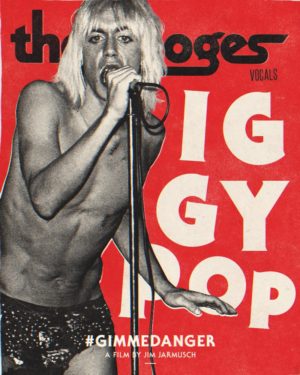On Wednesday, August 26th, hardcore hip-hop duo Ho99o9 (Horror) premiered a short documentary/stream of consciousness/montage of unreleased footage and music videos called Horror: Children of the Void.
Following the title card, the film begins with a series of Ho99o9’s personal home videos, showing them performing on various stages, signing autographs, and traveling from city to city; a documentation of their personal growth and performance. These scenes are spliced together haphazardly, edited with distorted filters, neon colors, and green screened into various trippy backgrounds. Maintaining the idea of the film’s sense of video collage, around the midpoint, a clip from Paid in Full (2002)—in which, one character, Rico, explains that he “mushed” a “whole cake” in someone’s face to wish him a happy birthday—is included. Said clip is then paralleled with a 2017 home video that was shot in Lisbon, where Ho99o9’s The OGM took his own cake (or possibly just a pile of whipped cream) and smashed it in Eaddy’s face in celebration of his birthday.
These light-hearted inclusions to the film, despite their entertainment value, don’t make up the bulk of what makes this film compelling, however. That said, in significant contrast to these scenes, Children of the Void contains a few subliminal features that hint at a much deeper discussion than what appears on the surface.
Since their debut, Ho99o9 have garnered a reputation for their willingness to speak on life’s atrocities, from police brutality (and the fact that it is namely targeted at Black people), to the failings of the United States government (and, in the same vein, the carelessness and misuse of power exhibited by politicians), and the plea for anarchy in the face of oppressive societal patterns. That said, they’ve gained a huge cult following, along with recognition for their abrasive, experimental style, and outspokenness regarding how most of what has been normalized is truly fucked up at its core (which they certainly aren’t wrong about). With Children of the Void’s opening scene, Ho99o9’s tendency for political commentary continues, and introduces the deeper meaning behind the film.
The film’s opening is a clip containing a controversial political advertisement, oftentimes known as the “Daisy Girl,” which was used during the 1964 U.S. presidential campaign of Lyndon B. Johnson. It begins with a shot of a young girl standing in a meadow, plucking petals off a daisy and counting down as each one falls. Once she gets to nine, the clip stutters three times, introducing Ho99o9’s emblematic symbol. As the campaign clip continues, the girl suddenly freezes as a male voice, giving his own countdown, is heard. As he arrives at zero, this signals a dramatic nuclear explosion, supposedly located at that same meadow. A voiceover from Johnson then rings out: “These are the stakes. To make a world in which all of God’s children can live, or to go into the dark. We must either love each other, or we must die.”
Johnson originally aired this clip as an action against his opponent, Barry Goldwater; it was meant to focus on the fact that Goldwater was a supporter of the Vietnam War, which, to Johnson, would ultimately result in turmoil. Johnson’s anti-war rhetoric here introduces a hidden message seen throughout the film, especially in relation to a clip that Ho99o9 posted on Instagram as a sort of introduction to the film, as well as the mentality they’ve adopted in the past regarding this very topic (see: their track, “War is Hell”).
Said Instagram montage is chock full of vaguely disturbing imagery, from a dog wearing an army uniform and nodding at the question, “Do you want to be the one to kill?,” to the boots of soldiers marching behind a nearly closed steel door, to a flying car, rapidly approaching a body of water and hitting the surface. The clips are fuzzy and grainy, as if taken from a VHS, and are soundtracked with haunting vocals, from screams to what sounds like growling. As the montage ends, Daniel Day Lewis’ monologue from his film, There Will Be Blood (2007), is heard; during this clip, he remarks, “I have a competition in me; I want no one to succeed.”
In relation to Johnson’s ad, this Instagram post contains a subversive discussion regarding how our society tends to work via the normalcy of war, as buried within its spin-chilling imagery. With Day Lewis’ monologue—taken from a film where an oilman enters a ruthless quest for wealth—and the scenes of the army—where, in this context, war and bloodshed is a direct route to “success”—Ho99o9 hints at the fact that, based on how our world is wired, we’ve been programmed to accept the commonality of violence and chaos as a method for gain. With the bone-chilling nature of this montage in relation to what it represents, it’s clear that Ho99o9 are saying that this system is disturbing and massively destructive.
Ho99o9 have never shown hesitancy in speaking up on topics such as this, even in the subtlest ways, and another subtle inclusion to the film that speaks on this message is it’s soundtrack.
As the scenes transition, they are backed with a variety of different songs, some being Ho99o9’s own (such as “Christopher Dorner” and “Street Power”), while others span across different genres and timelines. One of said tracks is a ‘60s tune, Teena Marie’s “Hypnotized” (taken down a few octaves), which contains a rather romantic undertone with the lines, “I’ll do whatever you say, command me, baby, and I’ll obey.” Another track is from cultist Charles Manson’s folk album, Lie: the Love of Terror and Cult, called “Look at Your Game, Girl.” The ballad has led many critics to draw comparisons between its lyrics—which seem to be an attempt at seducing a young woman—and Manson’s ability to manipulate his female followers.
As with the general idea of these mesmerizing tunes, we can become totally persuaded to believe and do anything with enough convincing (whether when falling in love or being brainwashed by a cult leader), which also vaguely relates to the way our world has “fallen in love” with the idea of war due to pro-war propaganda instead of roses and chocolate. In relation to war, much like Manson’s cult members or Teena Marie, those who support it have become “hypnotized” under false pretenses, into believing that war is a positive thing that it “protects the people,” when really, it’s an inherently violent, horrible practice.
Even now, we have a sort of war waging across the States in the form of riot police aggravating citizens who are taking to the streets, urging for abolition of the prison-industrial complex in the face of corruption and racism. Like pro-war propaganda that normalizes hatred and bloodshed as a means to “succeed,” pro-police propaganda encourages push-back against protestors who simply ask that Black people don’t face unnecessary pressure and restraint at the hands of law enforcement. Both of these situations, war and anti-police protest, reveal two sides of the same coin—both the military and police run off a falsehood that violence is a necessary means to an end.
This specific situation and the racism it implies relates to clips from an interview Ho99o9 gave with Dr. Martens back in 2018, which are shown toward the end of the film. In one of these clips, The OGM says,
“I hate racism. My parents are from Haiti, I’m Black, I live in America…There’s racism everywhere, everywhere, bro. Our music is, like, the one thing I feel like brings people together, and no matter what color you is, what race you is, what gender, what you like- if you like that song, we all share that in common. So, I just want everyone to get love out of that. No matter how brutal we sound up here, how angry I am—because I am frustrated most of the time—I still want you to get love out of that.”
Through this quote, The OGM takes his own spin on Johnson’s statement—“We must either love each other, or we must die”—by speaking to the sense of community and love that can be fostered via music, and their music specifically. In a world that is so plagued with war and other forms of violence, we must look to music and look to creators like Ho99o9 who hope to be able to pave the way for change, if not solely through the art they make, then through films such as this, which criticize the way things are and hope for something new to take their place. Otherwise, we might as well die.
Generally speaking, Children of the Void is a worth-while watch, especially for fans who are missing live music and want to relive how it feels to see Ho99o9 perform live. At the same time, it’s also consistent regarding Ho99o9’s politically-related outrage, notably in regard to what is taking place currently, making it an all the more relevant piece of work.
Aside from this film, Ho99o9 also recently released a new mixtape entitled Blurr—make sure to give it a listen.










